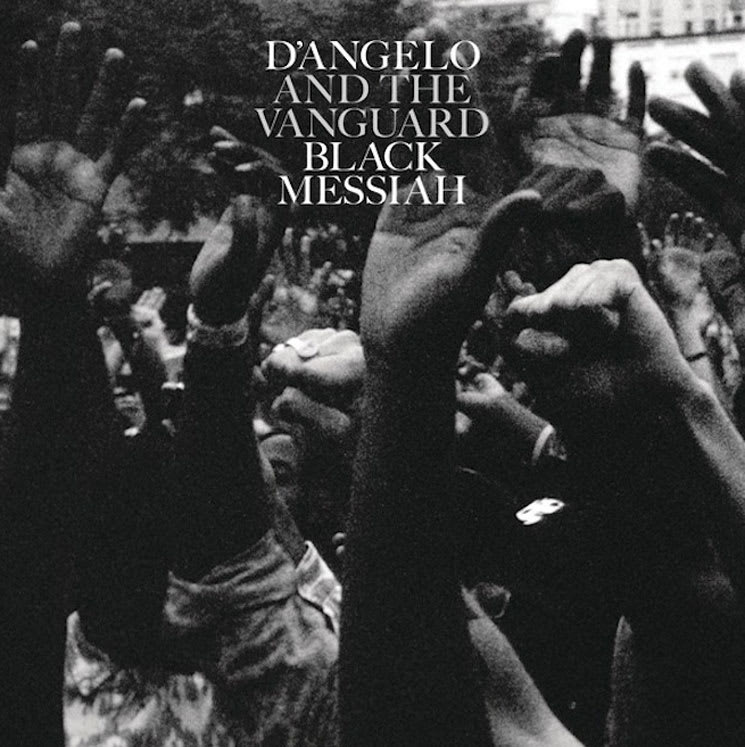Black Messiah has arrived and it has found us wanting. In certain religious denominations, churchgoers are familiar with the phrase, "He may not come when you want Him to, but He's always on time." It aptly suits the layered connotations of Black Messiah by prodigal neo-soul son D'Angelo. With little to no warning, it arrives to a congregation besieged, battle-worn, left hands-up and breathless by the tragic and tangled fates of Michael Brown and Eric Garner. The timely Black Messiah is fortuitously timed in this sense, and prescient in a way that invites the temptation to overhype its arrival simply by virtue of existing, rather than actual musical merit.
But the project (co-produced by the Roots' Questlove with contributions from Q-Tip, songwriter Kendra Foster, percussionist James Gadson and bassist-to-the-stars Pino Palladino) indeed delivers, and in spades. It inhibits a musical cosmos that modernized R&B has forsaken. It is beholden to an all-encompassing black music oeuvre, dusting off the colours of blues, rock and gospel to show that they still have worth in a mainstream context. Grimy riffs greet with opening salvo "Ain't That Easy," a Q-Tip-assisted banger that's slathered in funk grease, sliding down easy. D'Angelo's trademark vocals feel fresh yet soothingly familiar on this track and throughout the 12-track project.
"Black Messiah" is unswervingly political, spiritual and endowing at once. Sonic distortion rules the day on "1000 Deaths," a psyched up sermon that evokes spiritual deliverance and the clarifying reality of a Black Jesus buttressed by a blistering rock guitar solo and ominous, edifying lyrics: "Send me over the hill/ I was born to kill." The jazz hands-induced tap of "Sugah Daddy" brings the pot-bottom funk, playfully layered with filtered horns and springy piano. The track "Really Love" is familiar to concert-goers and as the lead single has been given extra sparkle, its Spanish guitar and soothing strings cooing smooth seduction.
"Back to the Future" parts One and Two vibe as free-wheeling interludes while ditties like the Prince-esque "The Charade" and "Till It's Done (Tutu)" speak truth to power, with subtle political messaging wrapped with otherworldly sitar and militaristic percussion, respectively. "Prayer" acts as a soul paean of sorts, stringing together rehabilitated "Thy Will Be Done" parochial platitudes against a funky reverb background. Closing things out is the transcendent soul vibe and Earth, Wind & Fire positivity of "Another Life."
Circling the perimeter, if there was an Achilles spot, it might be the predictability of "The Door," which feels superfluous on its own yet load-bearing in the overall scheme of things. But as a whole, the long gestating Black Messiah exists in its own airtight bubble, thriving apart from modern R&B yet transcending it with an Afrofuturist verve. Its very existence poses a question: Is Black Messiah that damn good, or does it stand as indictment, calling current R&B contemporaries, aka souled out Pharisees, to task?
D'Angelo has played the part of the wayward soul, drifting in depression and drug-addled despair, and now the 15-years removed Black Messiah feels like the album that should have naturally followed 2000's Voodoo two, maybe three years later. But it is here, it is masterful, it is heartening and it represents today's best from an R&B/soul perspective. Black Messiah has come and we weren't ready.
(Sony)But the project (co-produced by the Roots' Questlove with contributions from Q-Tip, songwriter Kendra Foster, percussionist James Gadson and bassist-to-the-stars Pino Palladino) indeed delivers, and in spades. It inhibits a musical cosmos that modernized R&B has forsaken. It is beholden to an all-encompassing black music oeuvre, dusting off the colours of blues, rock and gospel to show that they still have worth in a mainstream context. Grimy riffs greet with opening salvo "Ain't That Easy," a Q-Tip-assisted banger that's slathered in funk grease, sliding down easy. D'Angelo's trademark vocals feel fresh yet soothingly familiar on this track and throughout the 12-track project.
"Black Messiah" is unswervingly political, spiritual and endowing at once. Sonic distortion rules the day on "1000 Deaths," a psyched up sermon that evokes spiritual deliverance and the clarifying reality of a Black Jesus buttressed by a blistering rock guitar solo and ominous, edifying lyrics: "Send me over the hill/ I was born to kill." The jazz hands-induced tap of "Sugah Daddy" brings the pot-bottom funk, playfully layered with filtered horns and springy piano. The track "Really Love" is familiar to concert-goers and as the lead single has been given extra sparkle, its Spanish guitar and soothing strings cooing smooth seduction.
"Back to the Future" parts One and Two vibe as free-wheeling interludes while ditties like the Prince-esque "The Charade" and "Till It's Done (Tutu)" speak truth to power, with subtle political messaging wrapped with otherworldly sitar and militaristic percussion, respectively. "Prayer" acts as a soul paean of sorts, stringing together rehabilitated "Thy Will Be Done" parochial platitudes against a funky reverb background. Closing things out is the transcendent soul vibe and Earth, Wind & Fire positivity of "Another Life."
Circling the perimeter, if there was an Achilles spot, it might be the predictability of "The Door," which feels superfluous on its own yet load-bearing in the overall scheme of things. But as a whole, the long gestating Black Messiah exists in its own airtight bubble, thriving apart from modern R&B yet transcending it with an Afrofuturist verve. Its very existence poses a question: Is Black Messiah that damn good, or does it stand as indictment, calling current R&B contemporaries, aka souled out Pharisees, to task?
D'Angelo has played the part of the wayward soul, drifting in depression and drug-addled despair, and now the 15-years removed Black Messiah feels like the album that should have naturally followed 2000's Voodoo two, maybe three years later. But it is here, it is masterful, it is heartening and it represents today's best from an R&B/soul perspective. Black Messiah has come and we weren't ready.




